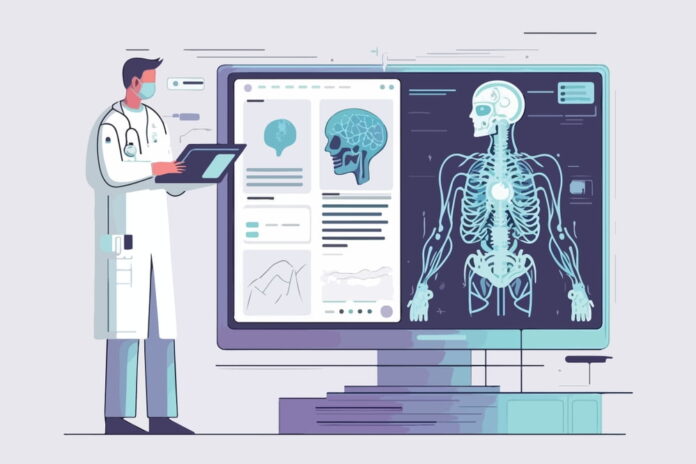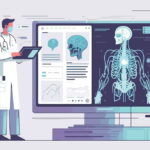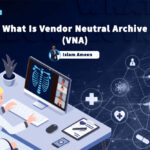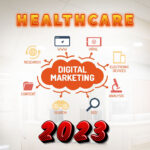As the world continues to advance technologically, one sector that will greatly benefit from these advancements is healthcare. The use of artificial intelligence has already begun revolutionizing the industry, and one tool that shows great promise in transforming healthcare is ChatGPT. This chatbot provides a unique approach to diagnosis and treatment, giving patients personalized support and advice within seconds. This blog discusses how ChatGPT is poised to transform the healthcare industry and revolutionize the way patients receive medical attention, from diagnosis to post-treatment monitoring.
1. The Power of ChatGPT in Healthcare
The power of ChatGPT in healthcare cannot be underestimated. This artificial intelligence chat bot has the capability to assist doctors with administrative tasks, freeing up more time for them to focus on patient care.
It can also summarize patient records, helping healthcare providers to quickly get a comprehensive understanding of a patient’s medical history. With its language processing capabilities, ChatGPT can also automate patient-clinician interactions, improving the overall patient experience.
These abilities, along with its game-changing fluency and creativity, make ChatGPT a potential game-changer in the rapidly growing healthcare industry. It is clear that AI technology, such as ChatGPT, is increasingly being embraced by the healthcare industry to address gaps in patient care and improve overall patient outcomes.
As we look to the future, it is likely that AI will play an even greater role in healthcare, transforming the industry in ways we may not have even imagined yet.
2. Increasing Access to Quality Care Through ChatGPT
In today’s world, where patients’ accessibility to quality healthcare is often limited by factors such as geography, ChatGPT is expected to bring a significant transformation that can save lives.
By providing patients with instantaneous access to medical advice and guidance, ChatGPT can improve access to quality care. Patients in remote areas can consult with doctors and obtain medical advice they would otherwise not have.
The technology allows patients to get guidance on their health issues without the need to visit a physician, saving them time and money. Also, the integration of ChatGPT into telemedicine platforms provides patients with on-demand access to virtual health consultations and triages their concerns.
Overall, the incorporation of ChatGPT in healthcare is expected to revolutionize the industry by expanding access to care in underprivileged communities while saving time, and money, and ensuring better healthcare outcomes.
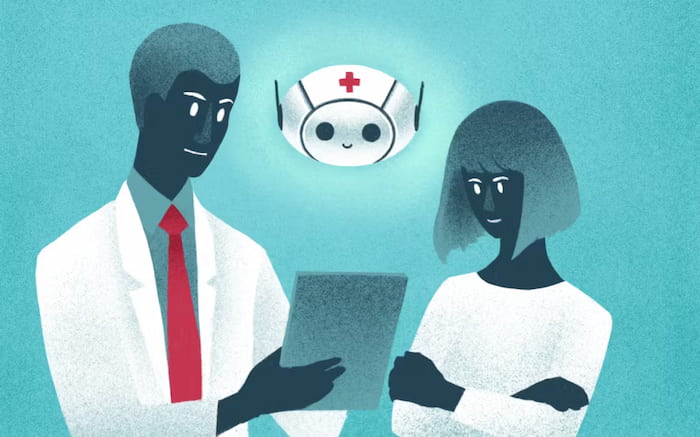
3. ChatGPT as a Digital Assistant to Physicians
ChatGPT’s potential as a digital assistant to physicians is immense, thanks to its AI and machine learning capabilities. The technology can assist doctors in automating workflows, freeing up much-needed time to focus on patient care.
ChatGPT can also help physicians interact with their patients by reviewing their symptoms, scheduling appointments, and providing treatment recommendations. By using ChatGPT, doctors can provide more efficient and personalized care to their patients, which can lead to improved health outcomes.
The healthcare industry is rapidly embracing AI, and ChatGPT is at the forefront of that revolution. The technology is poised to transform the healthcare industry, and its impact on patients and healthcare professionals alike will be significant.
4. Automating Patient-Clinician Interactions with ChatGPT
ChatGPT has the capability to revolutionize how patients interact with their healthcare providers. It can assist in automating patient-clinician interactions and provide quick, personalized responses. This could potentially simplify the entire healthcare process and lead to better outcomes for all parties involved.
By automating discharge summaries and clinical encounter reports, healthcare professionals can save time, allowing them to focus on caring for their patients. With its ability to analyze large amounts of medical data, ChatGPT can provide real-time, evidence-based recommendations to providers, further enhancing patient outcomes.
The integration of AI into chatbots will allow for more interactive and personalized experiences for patients. By automating these interactions, it has the potential to reduce healthcare costs and improve overall care delivery.
As part of the rapidly growing healthcare industry embracing AI, ChatGPT could play a significant role in shaping the future of healthcare.
5. ChatGPT and Similar Language Processing Tools Upending Medical Care
ChatGPT is just one example of how language processing tools are transforming the medical industry. The capabilities of this technology span beyond just conversational dialogue. Similar tools are being used to analyze vast amounts of medical data to identify trends and potential treatments.
These language processing tools are helping to automate patient diagnosis and treatment, allowing for quicker and more accurate medical care. With the help of AI, healthcare providers can more efficiently manage their workload, reducing burnout and ensuring that patients receive the best care possible.
As the healthcare industry continues to grow and evolve, it’s likely that we’ll see even more innovative uses of AI and chatbots like ChatGPT.
Read Also From Islam Ameen
- Chatgpt In Healthcare Is Disrupting The The Industry With New Capabilities
 As the world continues to advance technologically, one sector that will greatly benefit from these advancements is healthcare. The use of artificial intelligence has already begun revolutionizing the industry, and one tool that shows great promise in transforming healthcare is ChatGPT. This chatbot provides a unique approach to diagnosis and treatment, giving patients personalized support… Read more: Chatgpt In Healthcare Is Disrupting The The Industry With New Capabilities
As the world continues to advance technologically, one sector that will greatly benefit from these advancements is healthcare. The use of artificial intelligence has already begun revolutionizing the industry, and one tool that shows great promise in transforming healthcare is ChatGPT. This chatbot provides a unique approach to diagnosis and treatment, giving patients personalized support… Read more: Chatgpt In Healthcare Is Disrupting The The Industry With New Capabilities - What is Vendor Neutral Archive (VNA)?
 Are you curious about Vendor Neutral Archive (VNA)? Have you been hearing the term more and more, but don’t know what it means? If so, this blog post is for you! We’ll explain what a VNA is and how it can benefit healthcare organizations. Plus, we’ll provide an overview of the features and benefits of… Read more: What is Vendor Neutral Archive (VNA)?
Are you curious about Vendor Neutral Archive (VNA)? Have you been hearing the term more and more, but don’t know what it means? If so, this blog post is for you! We’ll explain what a VNA is and how it can benefit healthcare organizations. Plus, we’ll provide an overview of the features and benefits of… Read more: What is Vendor Neutral Archive (VNA)? - How To Choose The Best Teleradiology Company
 Are you an imaging facility looking to outsource your teleradiology reports? If so, you’ve come to the right place. Choosing the best teleradiology reporting company for your needs can be tricky, but with our guide on how to do it, you’ll be able to make an informed decision. Introduction Teleradiology is an important tool in… Read more: How To Choose The Best Teleradiology Company
Are you an imaging facility looking to outsource your teleradiology reports? If so, you’ve come to the right place. Choosing the best teleradiology reporting company for your needs can be tricky, but with our guide on how to do it, you’ll be able to make an informed decision. Introduction Teleradiology is an important tool in… Read more: How To Choose The Best Teleradiology Company - 2023 Buyer’s Guide For Choosing The Right Laboratory Information Management System (LIMS) That Fits Your Needs
 Are you thinking of buying a laboratory information management system (LIMS) for your clinical laboratory in a hospital or even a private lab?. If you, so you have come to the right place as we are here to help you choose the right LIMS / LIS that fits your facility needs. There is no doubt… Read more: 2023 Buyer’s Guide For Choosing The Right Laboratory Information Management System (LIMS) That Fits Your Needs
Are you thinking of buying a laboratory information management system (LIMS) for your clinical laboratory in a hospital or even a private lab?. If you, so you have come to the right place as we are here to help you choose the right LIMS / LIS that fits your facility needs. There is no doubt… Read more: 2023 Buyer’s Guide For Choosing The Right Laboratory Information Management System (LIMS) That Fits Your Needs - What Is Teledentistry? – Your Ultimate Guide
 Are you looking for a more convenient way to access dental services? Have you heard of teledentistry and wondered what it is and how it works? In this blog post, we’ll discuss an ultimate guide about it – what it is, how it works, and how it can make accessing dental care easier. What Is… Read more: What Is Teledentistry? – Your Ultimate Guide
Are you looking for a more convenient way to access dental services? Have you heard of teledentistry and wondered what it is and how it works? In this blog post, we’ll discuss an ultimate guide about it – what it is, how it works, and how it can make accessing dental care easier. What Is… Read more: What Is Teledentistry? – Your Ultimate Guide - Why Businesses Should Start Investing in SEO Quickly
 Search engine optimization is one of the effective med to long-term digital marketing strategies in 2023, has become a necessary expense for businesses that want to remain visible online. The competition for top-ranking search results is fierce, and businesses must continually invest in SEO in order to maintain and improve their position. SEO is an… Read more: Why Businesses Should Start Investing in SEO Quickly
Search engine optimization is one of the effective med to long-term digital marketing strategies in 2023, has become a necessary expense for businesses that want to remain visible online. The competition for top-ranking search results is fierce, and businesses must continually invest in SEO in order to maintain and improve their position. SEO is an… Read more: Why Businesses Should Start Investing in SEO Quickly - The Best Healthcare Digital Marketing Strategies in 2023
 As the world of marketing changes and adapts to new technology, so too must the strategies used to target consumers. In the healthcare industry, this is especially important, as patients are often inundated with advertisements and information from various providers. As we move into 2023, it is important for healthcare marketers to be aware of… Read more: The Best Healthcare Digital Marketing Strategies in 2023
As the world of marketing changes and adapts to new technology, so too must the strategies used to target consumers. In the healthcare industry, this is especially important, as patients are often inundated with advertisements and information from various providers. As we move into 2023, it is important for healthcare marketers to be aware of… Read more: The Best Healthcare Digital Marketing Strategies in 2023 - What Types of Incentives Work Best for Employees?
 This article discusses the types of incentives that work best for employees in your company. Incentives are one of the most important means that successful entrepreneurs and business owners resort to increasing employee productivity and efficiency, and providing monetary incentives to your employees not only encourages them to perform their work but also to stay… Read more: What Types of Incentives Work Best for Employees?
This article discusses the types of incentives that work best for employees in your company. Incentives are one of the most important means that successful entrepreneurs and business owners resort to increasing employee productivity and efficiency, and providing monetary incentives to your employees not only encourages them to perform their work but also to stay… Read more: What Types of Incentives Work Best for Employees?
6. Rapidly Growing Healthcare Industry Embracing AI
The healthcare industry is rapidly evolving with the adoption of AI technology. ChatGPT is just one example of how AI is transforming medicine as we know it. In the rapidly growing healthcare industry, AI is being used to analyse vast amounts of healthcare data, leading to more accurate diagnoses and improved patient outcomes.
As the demand for personalized care continues to increase, AI will become an essential tool for physicians to provide tailored treatment plans.
As the industry continues to embrace these technological advancements, there is no doubt that AI will revolutionize the healthcare industry by bridging healthcare gaps and improving the overall quality of care.
7. Predictions for the AI Market in 2030
Looking forward to the year 2030, experts predict that the Artificial Intelligence (AI) market will be worth a whopping $1,811 billion. Within the healthcare industry, AI is expected to be a game-changer with its ability to automate patient-clinician interactions through chatbots and similar language processing tools.
As the industry embraces these advancements, it is likely that AI-enabled virtual agents will be used to engage patients and offer them quality care.
This technology will serve as a digital assistant to physicians and bridge healthcare gaps that exist today.
Thanks to the impressive fluency and creativity of ChatGPT, the healthcare industry is on the verge of a seismic, tech-driven shift that promises to transform how we approach patient care.
With so much potential for positive change on the horizon, it is thrilling to consider what the future holds for AI in healthcare.
8. Game-Changing Fluency and Creativity of ChatGPT
One of the remarkable features of ChatGPT that makes it a game-changer in healthcare is its unrivaled fluency and creativity.
This AI chatbot is capable of generating natural language responses that are so lifelike that they can fool human users into believing they’re talking to a real person.
This level of fluency and creativity is what sets ChatGPT apart from other chatbots and makes it an ideal tool for healthcare professionals.
With its natural language processing capabilities, ChatGPT can help clinicians and patients communicate more effectively, leading to better treatment outcomes.
Additionally, the remarkable fluency and creativity of ChatGPT means it can generate innovative solutions to complex problems, opening up new possibilities for medical research and development.
Combined with ChatGPT’s other features, such as its ability to automate patient-clinician interactions and provide digital assistance to physicians, this makes it a truly game-changing technology in the healthcare industry.
9. Bridging Healthcare Gaps For Patients with the Help of Chatgpt
The healthcare industry is continually evolving, but there are still significant gaps in accessibility and affordability. One solution that has been gaining traction is the use of chatbots like Chatgpt to bridge these gaps.
These intelligent assistants can provide personalized medical advice, support, and diagnosis for patients who may not have access to healthcare professionals.
Chatgpt’s technology harnesses the power of artificial intelligence and machine learning algorithms to analyze patient data and offer treatment recommendations based on established protocols.
Patients can communicate with Chatgpt via text or voice commands, making it accessible for those with disabilities or limited internet access.
Additionally, because Chatgpt is available 24/7, it can help people who need immediate assistance when their regular healthcare providers are unavailable.
Moreover, bridging healthcare gaps via chatbot technologies such as Chatgpt could significantly reduce the burden on healthcare professionals by triaging patients according to their needs.
Conclusion
In conclusion, ChatGPT’s integration into the healthcare industry has proven to be a major game-changer. With its advanced capabilities, healthcare professionals can now receive real-time insights that aid in patient care decisions. However, the advancements in AI technology also bring about ethical implications that need to be acknowledged and addressed.
One of the significant issues that need addressing is how AI will disrupt traditional models of employment, leading to the creation of new kinds of organizations and jobs. It is apparent that AI presents a significant opportunity for the healthcare sector, but the industry must also work towards developing ethical guidelines to ensure fair and equitable use of AI in healthcare.
Overall, while ChatGPT’s integration into healthcare may bring about numerous benefits, it needs to be approached with caution and the utmost care to ensure that it is used to benefit both healthcare professionals and patients alike.

